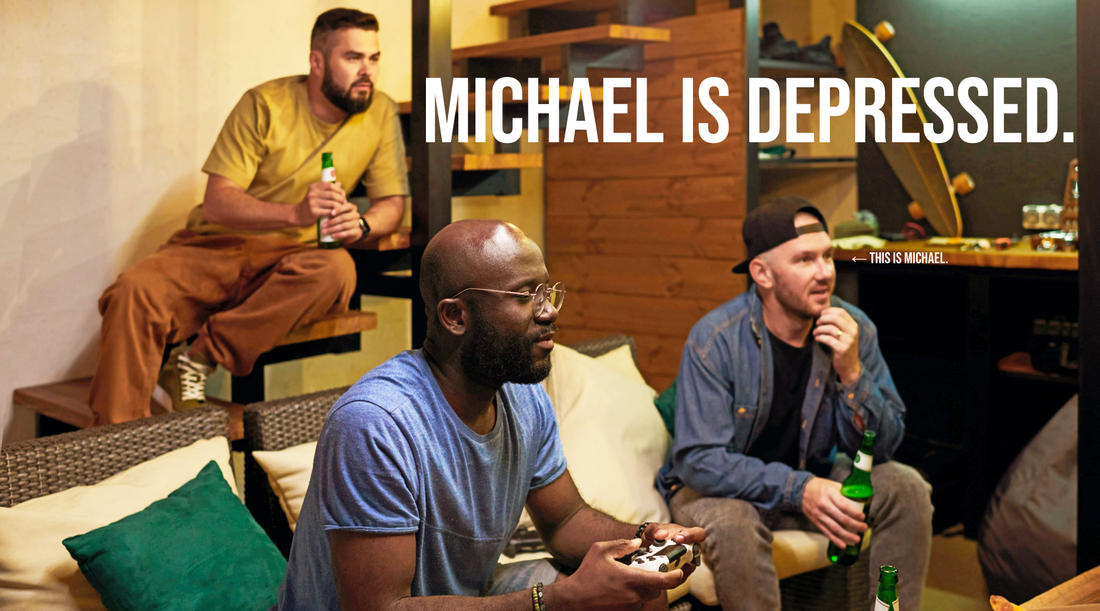
Depression is more than just being sad
At 19, I faced a storm that reshaped my understanding of myself and the world around me. The loss of my oma (my great-grandmother), the cornerstone of my childhood, plunged me into a darkness I had never known. This wasn't just grief. I wasn’t just sad; it was as if someone had thrown a blanket over the sun. It was a period marked by intense regret and a relentless replay of "should've, could've, would've" scenarios that refused to leave my mind.
What is Depression?
Depression, as I learned, is far more complex than the sadness or grief we all experience at some point. Depression is a common but serious mood disorder that causes severe symptoms affecting how you feel, think, and handle daily activities. It's a pervasive emptiness, a shadow that dims every color in life to grayscale. It's not just feeling sad; it's a profound despair that clings to your very being, making even the simplest tasks feel insurmountable.
According to the American Psychiatric Association, depression involves a significant change in one's emotional state, impacting daily functioning over a period of at least two weeks [1]. This definition underscores the depth and duration of the struggle faced by those with depression, distinguishing it from ordinary sadness or grief.
Symptoms of Depression

When you suffer from depression. (2022) from Depression Memes on Facebook
Depression manifests in various ways, and understanding its symptoms is the first step toward recognition and recovery. Here are some common symptoms of depression [2]:
- Persistent sad, anxious, or "empty" mood
- Feelings of hopelessness or pessimism
- Irritability
- Feelings of guilt, worthlessness, or helplessness
- Loss of interest or pleasure in hobbies and activities
- Decreased energy or fatigue
- Moving or talking more slowly
- Difficulty concentrating, remembering, or making decisions
- Changes in appetite or weight
- Thoughts of death or suicide, or suicide attempts
- Aches or pains, headaches, cramps, or digestive problems without a clear physical cause and/or that do not ease even with treatment
Who Gets Depression?
Depression can affect anyone—even a person who appears to live in relatively ideal circumstances [3]. Various factors contribute to depression, including:- Genetics
- Changes in hormone levels
- Certain medical conditions
- Stress
- Grief
- Difficult life circumstances
It's a democratic condition, not limited by age, race, gender, or socioeconomic status.
Depression Is Different From Sadness and Grief
Depression is a nuanced beast, often misunderstood and dismissed by phrases like "everyone gets sad." But sadness is to depression what a raindrop is to a hurricane. They're not the same. Depression can manifest as an overwhelming numbness, a despair so deep that it whispers lies about your worth and your place in the world. It's a battle, not just with your mind, but with the very essence of hope itself.
The distinction between sadness and depression is crucial. Sadness is a natural response to situations of loss or disappointment, a temporary cloud that eventually lifts. Depression, on the other hand, is an enduring storm, one that can obscure your path and make you forget what the sun even looks like. It's not a storm you can simply "shake off" because it's not just about feeling sad; it's about feeling disconnected from everything that once brought joy. It is persistent and can significantly interfere with daily functioning [4].
My Battle with Depression
Ever since I can remember, I've been shadowed by a profound sense of not belonging—not just in rooms or crowds, but in the very fabric of existence. This feeling was a constant companion through my childhood, feeding my doubts and insecurities.
My youth was filled with the turmoil of feeling outcast and misunderstood, both at school and what was supposed to be my haven, home. In my teenage years, I found solace only in the angsty sad music of the 90s and early 2000s as it mirrored my internal chaos. Yet, every attempt to carve out a space where I felt I belonged seemed to slip through my fingers.
Turning 18 marked my leap towards freedom. But also brought a lot of shame culturally, as leaving meant being disowned. So the shadow of not belonging trailed closely behind, coloring my relationships and self-perception. Comments meant to console often felt like dismissals of my struggle, underscoring a societal misconception that depression wears a recognizable face.
Depression, I've learned, is a complex mixture of deep-seated sadness, isolation, and a yearning for understanding. It's a signal calling for a profound shift in how we nurture our mental and emotional well-being.
Acknowledgment was my first step towards healing. It guided me towards therapy, meaningful changes, and a deeper connection with myself. It's a reminder that while depression may be part of my journey, it doesn't chart my course.
For anyone walking this path, know you're not alone. Your feelings are valid, and your experiences are significant. There's strength in seeking help, hope in healing, and infinite possibility in the stories we choose to write from here on out.
How Is Depression Treated?
Depression is among the most treatable of mental disorders, with between 80% and 90% of people responding well to treatment [5]. The most common treatments are:- Medication
- Psychotherapy
- Electroconvulsive Therapy (ECT) and other brain stimulation therapies
- Self-help and coping strategies
When to Seek Help

If you or someone you know is experiencing symptoms of depression, it's important to see a healthcare provider. Early intervention can lead to more effective treatment and a faster recovery.
In cases where thoughts of harming oneself or others arise, it's crucial to seek immediate help. The National Suicide Prevention Lifeline is available 24/7 at 1-800-273-TALK (1-800-273-8255) for support.
Free and Low-Cost Resources
Despite the strong demand and growing societal awareness of the importance of mental health, a study revealed that 74% of Amercians do not believe mental health services are accessible to everyone, and 47% believed that options were limited [6]. If you’re like nearly one in four (25%) of Americans that have to choose between getting mental health treatment and paying for daily necessities, here are some free and low-cost resources for you to consider:- National Suicide Prevention Lifeline: 1-800-273-TALK (1-800-273-8255), a free, 24-hour hotline available to anyone in suicidal crisis or emotional distress.
- The Trevor Project: Offers a safe, confidential place for young LGBTQ individuals to talk. Call 1-866-488-7386 or text START to 678678.
- Crisis Text Line: Text HOME to 741741 for free, 24/7 crisis support in the US.
Many schools and universities offer free counseling services to students, providing an accessible option for those in need. These services can be a valuable resource for individuals seeking help without financial burden.
Mental Health Apps to Consider
Technology offers accessible tools to support our mental, emotional, and spiritual well-being. Here's a list of must-have mental health apps recommended by HOPE’s Clinical Health and Well-being staff, designed to aid in mindfulness, reduce anxiety, and foster a greater sense of inner peace [7].
Calm
- Features: Offers breath work, guided meditations, music, and sleep assistance.
- Cost: 7-day free trial available; subscription required thereafter.
Ten Percent Happier
- Features: Provides courses on mental health topics, mindfulness practice reminders, podcasts, and access to a coach.
- Cost: Offers a trial period; subscription-based.
Insight Timer
- Features: A vast library of free meditations and yoga exercises, focusing on sleep, work, and includes live classes.
- Cost: Free.
Tech into Care
- Features: An initiative by the National Center for PTSD offering a range of apps for supporting veterans with PTSD and related issues.
- Cost: Free; specifically designed for veterans and those supporting them.
MoodMission
- Features: Logs your mood and suggests five coping exercises based on evidence-based practices.
- Cost: Free; offers in-app exercises to help cope with emotions.
Sanvello
- Features: Promotes a happier you through self-care practices, peer support, coaching, and therapy options. Includes mood tracking and daily reminders for self-care.
- Cost: Many features available for free.
MoodFit
- Features: A customizable app that allows you to tailor support based on your needs, offering a variety of free features to support mental health.
- Cost: Free for many features.
Headspace
- Features: Focuses on mindfulness with a vast library of meditations, sleep aids, and stress relief exercises.
- Cost: Subscription-based; favored by caregivers for its comprehensive mindfulness practices.
The Power of Connection
Navigating depression requires courage and support. Sometimes, the best first step is confiding in someone you trust. Establishing a "bat signal" – a unique phrase or word indicating you need help – can be a lifeline. Whether it's "Thanos snapped his fingers" or "Cowabunga," this signal can be a discreet way of asking for support when you're struggling to articulate your needs directly.
Depression is a complex condition, but with the right support and treatment, recovery is possible. Remember, reaching out for help is a sign of strength, not weakness.
References
[1] American Psychiatric Association. (n.d.). What Is Depression? Retrieved from https://www.psychiatry.org/patients-families/depression/what-is-depression[2] National Institute of Mental Health. (n.d.). Depression. Retrieved from https://www.nimh.nih.gov/health/topics/depression
[3] Mayo Clinic. (n.d.). Depression (major depressive disorder). Retrieved from https://www.mayoclinic.org/diseases-conditions/depression/symptoms-causes/syc-20356007
[4] American Psychological Association. (n.d.). Depression and How Psychotherapy and Other Treatments Can Help People Recover. Retrieved from https://www.apa.org/topics/depression/recover
[5] Mayo Clinic. (n.d.). Depression (major depressive disorder). Retrieved from https://www.mayoclinic.org/diseases-conditions/depression/diagnosis-treatment/drc-20356013
[6] National Council for Mental Wellbeing. (n.d.). Lack of access: Root cause of mental health crisis in America. The National Council. Retrieved from https://www.thenationalcouncil.org/news/lack-of-access-root-cause-mental-health-crisis-in-america/
[7] Hope For The Warriors. (n.d.). HOPE’s favorite mental health apps. Retrieved from https://www.hopeforthewarriors.org/hopes-favorite-mental-health-apps/
